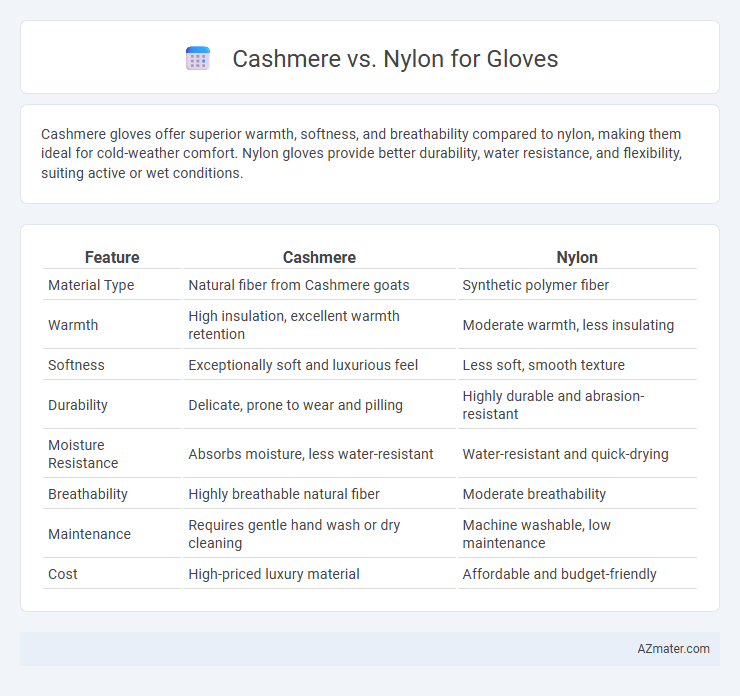Cashmere gloves offer superior warmth, softness, and breathability compared to nylon, making them ideal for cold-weather comfort. Nylon gloves provide better durability, water resistance, and flexibility, suiting active or wet conditions.
Table of Comparison
| Feature | Cashmere | Nylon |
|---|---|---|
| Material Type | Natural fiber from Cashmere goats | Synthetic polymer fiber |
| Warmth | High insulation, excellent warmth retention | Moderate warmth, less insulating |
| Softness | Exceptionally soft and luxurious feel | Less soft, smooth texture |
| Durability | Delicate, prone to wear and pilling | Highly durable and abrasion-resistant |
| Moisture Resistance | Absorbs moisture, less water-resistant | Water-resistant and quick-drying |
| Breathability | Highly breathable natural fiber | Moderate breathability |
| Maintenance | Requires gentle hand wash or dry cleaning | Machine washable, low maintenance |
| Cost | High-priced luxury material | Affordable and budget-friendly |
Introduction to Cashmere and Nylon Gloves
Cashmere gloves are prized for their exceptional softness, warmth, and natural insulation derived from the fine undercoat of cashmere goats. Nylon gloves, made from synthetic polymer fibers, offer durability, lightweight flexibility, and water resistance, making them ideal for active or outdoor use. Both materials serve distinct purposes, with cashmere emphasizing luxury and warmth, while nylon prioritizes practicality and resilience.
Material Properties: Cashmere vs Nylon
Cashmere gloves offer superior softness, insulation, and breathability due to the natural fibers derived from cashmere goats, making them ideal for warmth in cold weather. Nylon gloves provide exceptional durability, elasticity, and water resistance, often combined with synthetic blends to enhance wearability and longevity. The choice between cashmere and nylon depends on prioritizing comfort and thermal insulation versus strength and moisture protection in glove materials.
Warmth and Insulation Comparison
Cashmere gloves offer superior warmth and insulation due to their fine, natural fibers that trap heat effectively while remaining lightweight and breathable. Nylon gloves, made from synthetic fibers, provide good wind resistance and durability but generally lack the insulating properties of cashmere, making them less warm in extremely cold conditions. For maximizing warmth, cashmere gloves outperform nylon by maintaining consistent thermal regulation and moisture-wicking capabilities.
Comfort and Softness: Which Feels Better?
Cashmere gloves offer superior comfort and unmatched softness due to their fine, natural fibers that provide excellent insulation and breathability. Nylon gloves, while more durable and water-resistant, often lack the plush, cozy feel of cashmere and may feel less gentle against the skin. For those prioritizing luxury and tactile comfort, cashmere clearly outperforms nylon in delivering a softer, more comfortable glove experience.
Durability and Longevity of Each Material
Cashmere gloves offer exceptional softness and warmth but tend to wear out faster due to their delicate fibers and susceptibility to pilling, making them less durable for heavy use. Nylon gloves are highly durable, resistant to abrasion, and maintain their structural integrity over prolonged periods, making them ideal for activities requiring robustness. While cashmere provides luxury and comfort, nylon's longevity and strength make it the preferred choice for gloves demanding sustained durability.
Style and Aesthetic Appeal
Cashmere gloves offer a luxurious, soft texture and a refined, elegant look that enhances sophisticated winter wardrobes. Nylon gloves provide a sleek, modern aesthetic with a lightweight, durable finish ideal for active or casual styles. The choice between cashmere and nylon hinges on the desired balance of classic elegance versus contemporary practicality in glove fashion.
Breathability and Moisture Management
Cashmere gloves offer superior breathability due to their natural fibers, which allow moisture to evaporate efficiently, keeping hands dry and comfortable. Nylon gloves, while durable and water-resistant, typically trap heat and moisture, reducing airflow and leading to clammy conditions during extended wear. For optimal moisture management and breathability, cashmere remains the preferred choice in cold weather gloves.
Care and Maintenance Requirements
Cashmere gloves require gentle hand washing with cold water and mild detergent to maintain softness and prevent fiber damage, and should be dried flat away from direct heat sources to avoid shrinking or warping. Nylon gloves demand less delicate care, often machine washable with cold water and mild detergents, drying quickly without losing shape or functionality. Proper storage away from moisture and prolonged sunlight is crucial for both materials to preserve durability and appearance.
Price and Value for Money
Cashmere gloves often come with a higher price tag due to the luxurious softness and natural insulation they provide, making them a premium choice for warmth and comfort. Nylon gloves, on the other hand, are significantly more affordable and offer excellent durability and water resistance, ideal for budget-conscious buyers seeking functional value. Evaluating cashmere vs nylon gloves involves balancing the higher cost of cashmere against the practical, long-lasting performance of nylon for overall value for money.
Choosing the Right Glove: Cashmere or Nylon?
Cashmere gloves offer superior warmth, softness, and breathability, making them ideal for cold weather and luxury wear, while nylon gloves excel in durability, water resistance, and flexibility for active or wet conditions. Choosing the right glove depends on prioritizing insulation and comfort with cashmere or durability and moisture protection with nylon. Consider factors like climate, activity type, and desired glove lifespan to make the best material choice.

Infographic: Cashmere vs Nylon for Glove
 azmater.com
azmater.com